Ask the importance of just one healthy eye to those who suffer from visual impairment. Similarly, ask the value of one
Candidates
spot to those
Indian chess
followers who waited for 32 years to see the second Indian to reach there.
Viswanathan Anand
was the first in 1991. And now, we have at least two – R Praggnanandhaa and Vidit Gujrathi. And possibly a third in
D Gukesh
too.
No Indian, except Anand, had come even close earlier.
Prag, a Chennai product from the stable of coach RB Ramesh, clinched the spot by reaching the World Cup final in Baku, Azerbaijan, in August. Gujrathi of Nashik, Maharashtra, followed it by winning the Isle of Man FIDE Grand swiss league event last month.
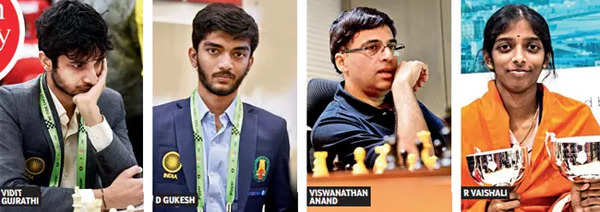
The eight-player round-robin women’s Candidates event has been introduced for the first time. Prag’s sister,
R Vaishali
, duly clinched a seat there. She also became only the third Indian woman after K Humpy and D Harika to become a GM. She could have Humpy’s company for the Candidates.
Both the men’s and women’s Candidates events scheduled in April next year will be played concurrently to find the challengers for reigning champions Ding Liren and Ju Wenjun (both China).
“The movement which began with
Chess
Olympiad 2022 indeed fructified in a healthy manner with India capturing a formidable position in World Chess. Vaishali made a great leap of around 80 Elo Points, Vidit displayed skills of a complete player with universal style,” said chess analyst and former national champion Pravin Thipsay.
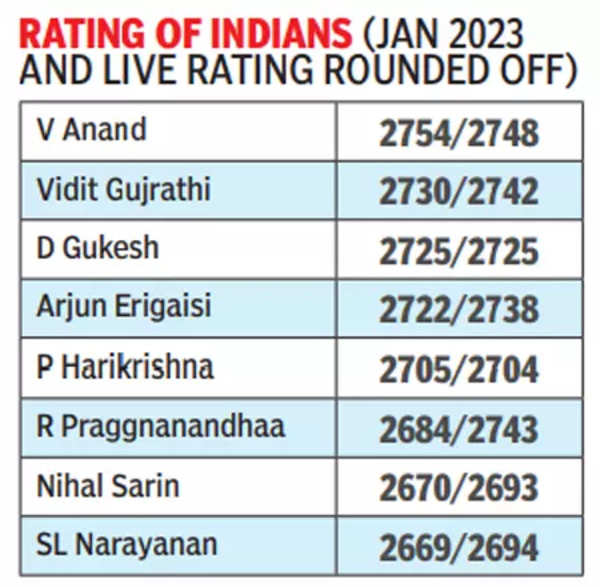
“India showed great progress this year. China and Russia were the strongest chess countries in recent years. But recovery from the Covid pandemic and war in Ukraine made both weaker. India capitalised on that with their youngsters making the most of it. Russia is out of the European Union now and affiliated to the Asian chess federation,” Prag’s coach Ramesh said.
Though chess has always been a high priority sport in the government files because of India’s success in global age-group events, the positive effect of private sponsorship and involvement of absolute greats in the development programme (Westbridge Anand Chess Academy) have given real dividends only now. The Lightning Kid (Anand) has played a big role in making India’s progress electric.
After the successful hosting of the Olympiad in Tamil Nadu last year, India also showed its financial might with the inaugural Global Chess League in Dubai. IT giants Tech Mahindra were the title sponsors. The AICF and state units also aim to set up factories for producing IM and GM norms and titles where Elo points change hands without facing much spotlight.
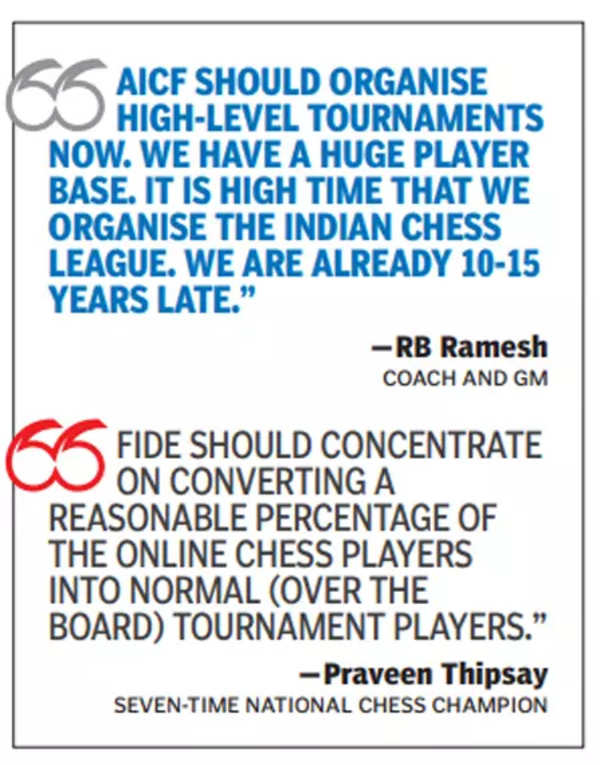
Ramesh said, “Our chess progress so far has been a result of individual efforts. What we need is institutionalised coaching programmes. We have trainers and talented players. The AICF, governments and sponsors must chalk out plans and provide platforms. We have to use our strengths with a proactive approach.”
Thipsay provided a word of caution saying the AICF and all other national sports federations may face problems due to changes by the government in the eligibility criterion of office bearers.
GM and coach Abhijit Kunte, a winner of Dhyan Chand Lifetime achievement award said, “A majority of top-10 to 15 Indian players in both men’s and women’s sections are under the age of 25. So, they will be around for at least 10-15 years more. Plus, there is a push from the second string. And we are not dependent on one coach, one sponsor or one organiser. Hence our progress is relatively immune to pullouts. There is no doubt that Indian chess will have a brighter future and Indians will get their shot at the World title.”
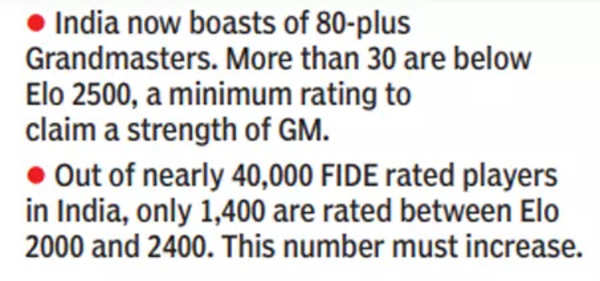
Chess is not a spectator sport (nobody would pay to watch the games live) and the players need the fuel of money for sustained and real progress.
“We need an umbrella tournament so that a sizeable pool of players is rewarded well to keep them going,” said Kunte. “Organising norm events and closed events to attract foreign players is important too.”
On one hand, the chess engines and their evaluation is becoming stronger and more precise. At the same time, the players are realising the value of intuition, emotion, playing with creativity and even understanding the immense value of sub-par moves in certain situations.
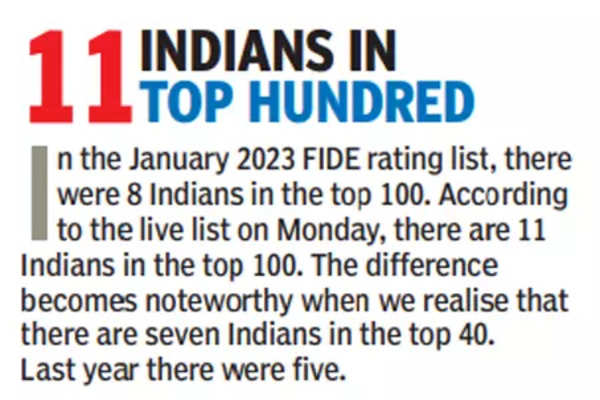
The Covid pandemic opened online avenues for chess and forced elite players to play. It brought high prize money along with lack of reliability and question marks
over ethical play.
The cheating controversies – with Carlsen vs Niemann and Kramnik vs Rest of the World winning the spotlight – brought to fore the ugly face of chess and the embarrassment of washing dirty linen in public.

Chess, by nature, is a game of hidden moves. Transparency and trust are difficult to expect in this cerebral game. More so in the online events where new devices and new technology are giving cutting edge to the cheaters. There is a growing feeling that FIDE and private organisers are not well equipped to handle this mess.
Lack of credibility with online chess could prove a blessing in disguise for the over-the-board version.









 English (US) ·
English (US) ·